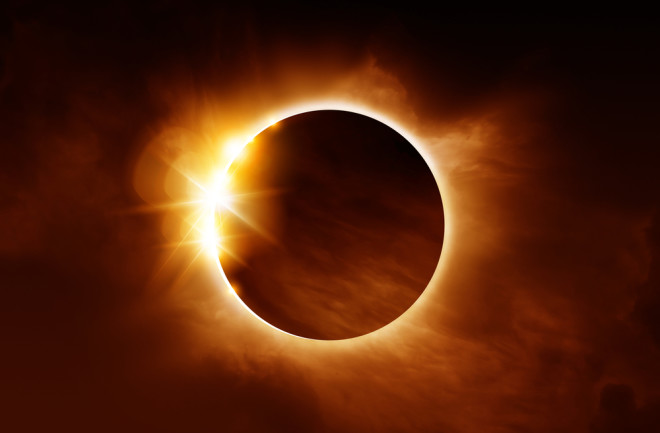In ancient cultures, solar eclipses were seen as apocalyptic prophecies, omens of the displeasure of the gods, periodic celestial coincidences, or some mixture of all three. The events stopped wars, made temporary kings, and perhaps founded ancient cities.
Solar eclipses may strike awe or even fear in people, especially those less versed in astronomy. After all, they can turn an ordinary bright, clear day into relative darkness as the moon slowly blocks the sun. In ancient times, people could have seen this as a sign the world would end if they were predisposed to thinking about such an apocalypse.
But not all ancient cultures saw these eclipses in quite the same way. Here’s a look at how some societies viewed these astronomical events in the past.
Read More: Here's Your Guide to Seeing the 2024 Solar Eclipse
1. Ancient China
Chinese documents have recorded more than 900 solar eclipses throughout history. Early descriptions occur in the Shu Ching, or Book of Historical Documents, a famous compilation that dates back more than two millennia.
In one case, the text describes the sun and moon not meeting “harmoniously,” as well as a general scene of chaos among people during the event. Elsewhere, the text describes another eclipse as being “very bad.” The Shu Ching also mentions a case more than four millennia earlier when a king of the Xia Dynasty ordered the death of astronomers who never predicted a solar eclipse that occurred.
Astronomy improved though, and by the beginning of the A.D. 7th century, astronomers were more accurately predicting the occurrence of solar eclipses.
2. Mesoamerica
The Nahua language, used by the Aztecs and others, described solar eclipses as the sun being eaten, according to Ismael Arturo Montero García at the National Institute of Anthropology and Archaeology in Mexico in a press release.
The ancient Maya could also predict eclipses with some accuracy, and held rituals since the celestial bodies represented gods. García said that many Mesoamerican cultures associated eclipses with death, while some researchers believe that an eclipse that occurred in April 1325 may have determined the founding of the Aztec city of Tenochtitlan.
3. Ancient Greece
Unlike its portrayal in the recent Indiana Jones movie, the Antikythera mechanism discovered in a shipwreck was designed in part to predict lunar and solar eclipses and dates more than two millennia ago.
At some point, the Greeks believed that eclipses were omens — historian Herodotus wrote that one such event even stopped a war between the Medians and Lydians around the 6th century B.C.
Read More: How Long Will The Solar Eclipse Last? It Depends
4. Mesopotamia
Several cultures held different rituals surrounding the prediction of solar eclipses and the Mesopotamians were particularly good at predicting the events. Most people thought the solar eclipses were omens of ill things to come. The rulers of Assyria seemed to be superstitious themselves, or at least paranoid.
When astronomers predicted the location of solar eclipses for viewers to see, rulers would sometimes put a temporary king on the throne, according to Sarah Graff, a curator at the Metropolitan Museum of Art in New York City. This one-day king was supposed to act like a decoy while the real king hid from the ill-omened danger. Unfortunately for the temporary ruler, the ill omen rang true — the imposters were usually killed after the eclipse was over.
5. Ancient Egypt and the Bible
The Old Testament of the Bible mentions an episode when the sun and moon stood still in answer to Joshua’s prayers in Canaan, so that his army could get revenge on their enemies. Some modern scholars, digging into older Hebrew translations of this text, believe that the words might have just meant that the sun and moon stopped shining as brightly.
The researchers calculated that an annular eclipse might have taken place on 1207 B.C., a time when other Egyptian evidence describes a battle with the Israelites at Canaan. If this biblical episode really does describe an ancient eclipse, it might even help to sort out uncertainties about the timeline of Egyptian rulers like Ramesses the Great.
Article Sources
Our writers at Discovermagazine.com use peer-reviewed studies and high quality sources for our articles, and our editors review for scientific accuracy and editorial standards. Review the sources used below for this article:
Popular Astronomy. A statistical survey of solar eclipses in Chinese history.
Gobierno de Mexico. Los eclipses, “el Sol devorado”, un fenómeno celeste predictible en el México antiguo.
University of Cambridge. Oldest recorded solar eclipse helps date the Egyptian pharaohs.
Oxford Academic. Solar eclipse of 1207 BC helps to date pharaohs.

